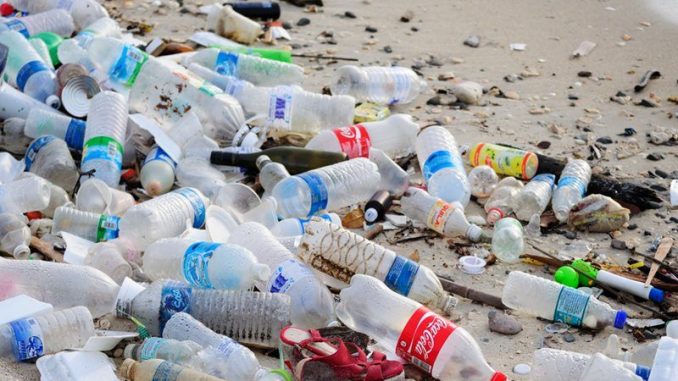
Look around you. How many plastic products do you see?
If you can’t name too many, think about your lunch today. Did you drink from a plastic soda or water bottle? What about the plastic lining in your coffee cup? Was your food packaged in plastic, did you drink from a plastic straw? Maybe you had some microwaveable popcorn as a snack — watch out, popcorn bags are also lined with plastic.
Going beyond single-use plastics, think about the items you use on a daily basis. Your makeup, moisturizer, hand sanitizer, body wash, toothbrush and toothpaste tubes are all most likely contained in or created out of plastic.
The frightening truth is that plastic is a mass polluter that infiltrates almost every aspect of our lives. Mostly in ways we never think about. But it’s not your fault. Many of us use plastic every day because we aren’t offered any other option. Maybe you would buy canned water or food packaged in glass jars if you saw it on shelves, but these choices aren’t always readily available.
But why is this such a big deal? Can’t we just recycle all the plastic we use? Unfortunately, the answer is: not exactly.
During her talk “Planet or Plastic?” on March 3, former Environmental Protection Agency Administrator Judith Enck claimed that “Plastic recycling has been a failure. Right now we’re recycling about 8.5% of plastics.”
This is due to the fact that only plastics categorized as number one (soda bottles, mineral water, cooking oils), number two (laundry detergents, shampoo bottles, milk jugs) and sometimes number five (toys, luggage, furniture) get recycled. All other plastics do not.
What’s scary about this is that plastics take centuries to decompose, so the plastic products you used today will last longer than your lifetime. Not only do plastics pollute our land but, “every year about 8.8 million metric tons of plastic go into the ocean,” according to Enck. This is life-threatening for marine animals who mistake plastics for food and end up starving to death. Alarmingly, by 2050 it is estimated that there will be more plastic in the ocean than fish if we do absolutely nothing.
So what can we do?
Although the practice isn’t necessarily easy, Enck may argue that the solution is simple: “We have to make and use less plastic.”
Enck’s organization, Beyond Plastics, encourages changes made at a governmental, corporate and personal level.
“Governments need to impose bans and adopt laws that require extended producer responsibility,” the Beyond Plastics website affirms.
Luckily, New York State recently passed a plastic bag ban which went into effect on March 1 and Ulster County passed a “Skip The Straw Law” in December which made plastic straws, cutlery and other items available only upon request at restaurants.
At a corporate level, Enck pointed out that large companies have begun corresponding with their packaging companies to stop using plastic and Lego has announced that in the future they wish to no longer create their toys out of plastic.
At a personal level, individuals can carry stainless steel silverware with them, buy metal water bottles, opt for bamboo toothbrushes, ask to not be given a straw at restaurants, spread the word about plastic pollution and put pressure on local lawmakers to do what’s right.
